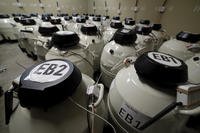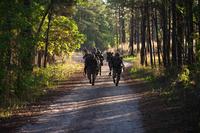UNLEASH THE CHICKENS OF WAR!
Humans aren't the only species getting ready to do battle in Iraq.
"The U.S. Army will use birds to combat chemical warfare. The Navy has deputized sea lions. And the enemy could retaliate with kamikaze camels," according to the Philadelphia Inquirer.
Chickens will cross the desert in cages atop Humvees driven by soldiers and marines. If the chickens keel over, troops will know to don protective gear (to shield against chemical weapons).
The military calls it Operation Kuwaiti Field Chicken, or KFC.
While chickens go to war on land, sea lions will patrol offshore. The Navy says some of the 20 sea lions it has trained in apprehension, mine recovery and defusing are deployed in the Persian Gulf.
Occasionally, animals have been used as weapons. Troops stationed in Afghanistan are still warned to be careful around camels, which the mujahideen strapped with explosives and blew up by remote control in their war against the Soviets.
No absolutely no one's surprise, People for the Ethical Treatment of Animals is aghast at the thought of our furry friends being used in war.
"These animals never enlisted, they know nothing of Iraq or Saddam Hussein, and they probably won't survive," said PETA spokesman Arathi Jayaram.
(via Military.com)
THERE'S MORE: While the Marines will continue to use the chicken test, the Army will not.
Contrary to what the Inquirer reported, "The Army wont be employing the same method U.S. Marines in Kuwait had used to help detect the presence of chemical agents h using chickens, like canaries in coal mines, to warn of poisonous gases," according to Stars and Stripes. "One reason: Small animals require about 10 times the exposure humans do to be affected, so by the time the already-nervous fowl cry foul, its too late, said Army Brig. Gen. Stephen Reeves, program executive officer for the Defense Departmentms chemical and biological defense programs. And their feathers act as a protective barrier against some agents that could harm humans."








